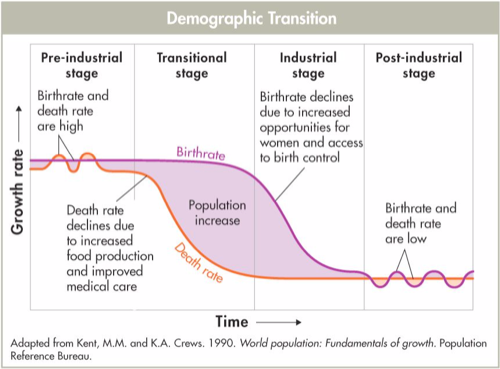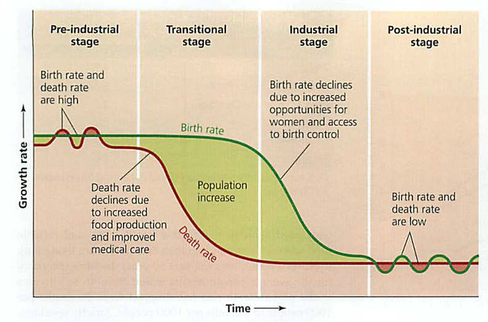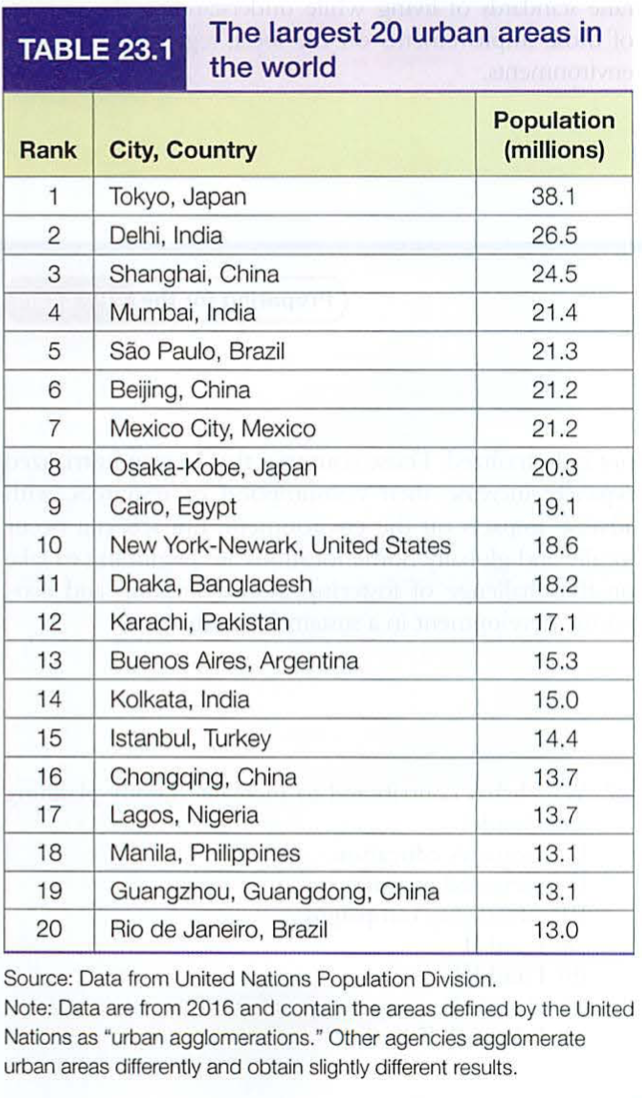First of all a flow diagram:
 |
|
Click for full-size image |
Note that this is for a country, not the planet, since people (so far) are not leaving the planet...or arriving from elsewhere.
National version as a formula:
If you look at the planet as a whole (sans aliens or Elon Musk):

so, there is a neat shorthand formula for this:
Which is an estimate, the real number is 69.3 (why? look below if you want to know)
Here is an example:
Note that as the growth rate increases, the doubling time decreases.
Look for this on the AP as multiples/fractions of 70: 14, 28, 35, and so on...
You can also see this by using our previous formula: Nt = Noe^rt
Set N to 100, try with a 7% growth rate (0.07 is r) and set time to be 10 years (70/10)
Calculate Nt
Here's what this might look like:
 |
|
Click for full-size image |
When calculating growth rates, always use the CHANGE in population divided by the base population, e.g. 7/100 is 7% growth rate, so this population would go from 100 to 107, like in the chart above.
Now, to babies: TFR is the total number of babies a woman will have in her lifetime.
Replacement level fertility (RLF) is just above 2.0, (usually 2.1, as some babies don't reproduce or make it to reproductive age).
What does this mean in Japan, where young people are not having babies?
RLF depends on developed/developing nations as well (clean water, medical care, access to food, war)
Life expectancy: depends on these as well...
Infant mortality: under age 1 (reason for big Hawaiian one year birthdays)
child mortality: under 5
Look up life expectancy in 1900...
Look up the average family size and how many made it to age of 5 in 1900
What portion of the US population was farmers then?
Age structure diagrams/population pyramids-check these out: UAE, Japan, Sudan, Iraq/Iran, Russia----WHY?
See also baby boom and boom echoes...
Check this out:
...and look these up:
- Go to 1950 and look at the US population. Look again in 1960. Where is the baby boom? Why were there so few babies born during 1940-45?
- If you were a 42 year old American in 2000, when were you born? How old are your kids? Find the "boom echo".
- Find the impact of the Iran/Iraq war of 1980-89, which side had the biggest impact? If you were a 35 year old Iraqi man in 1995, how old were you during this war?
- If you are a 30 year old German man in 1950, when were you born? How old were you in WWII (1936-1945)?
- If you were a 35 year old woman in Japan in 1960, why are there so few men to choose from?
- Look at the UK in 1960. Where are the casualties of WWII, and are they both male and female? Explain.
- What the heck is going on in UAE?
- Look at Russia in 1960. What gaps do you see? Why?
- Information about China is very spotty-why would this be? See if you can find the impact of the one-child policy from 1979-2021.
- Compare present day Japan to Africa. What issues will they need to address?
- Look at present day Italy, Japan and Germany. What is common?
- Compare present day India and China. What do you see?
Terms to know: Human Populations-----------------------------
Fecundity: the ability to reproduce
Fertility: production of offspring
CBR: crude birth rate: births per 1000 people
TFR: total fertility rate: total kids per woman in her lifetime (25-30!)
ZPG: zero population growth: 5+ where infant mortality is high, 2.1 is normal
China: was 6 -> 1.8 (below replacement level since 1979, one child policy)
China has a 140/100 male to female ratio: why?
Global TFR is 2.6
CDR: crude death rate: deaths per 1000
Why is there a life span? mitochondrial DNA...
1900 Indian man had life expectancy of 23! Trace this to now...
Not now, reasons: nutrition CLEAN WATER, sanitation, education
75 men, 85 women (testosterone, war, "hold my beer and watch this!", Darwin Awards)
Dependency ratio; baby boomers and your future: how many workers to retirees
imagine your life at your age in other countries...
Russia low TFR: alcoholism and antibiotic resistant Tuberculosis
Module 23 Demographic Transition
 |
|
Click for full-size image |

Things to notice:
1. in phase 1, lots of babies, lots of death (infant mortality and short lifespans), so population is low
2. as clean water, sanitation and health care improve, deaths drop, so population rises
3. as women gain reproductive rights and/or education, the birth rate drops (many factors here), while death rate stays low, so the population growth curve flattens a bit (hard to see on this diagram)
4. as industrialization includes more women, esp. as professionals, they may delay pregnancy later in life, so there is actually a population drop. Examples are Italy, Japan and Germany, where the dependency ratio (number of people depending on social retirement divided by number of people in the workforce paying into the system) is greater than 1.0.
Make sure you can cite at least one example country for each...
1. Sub-Saharan Africa, most of the world before the industrial revolution
2. Afghanistan
3. US
4. Japan
Another view:
IPAT formula:
Imagine two scenarios:
Case 1: A sustainable pacific island community, no phones, internet or electricity. Food sources are local, there is little affluence (tribal community), also less poverty, and a self-limiting population, limited by K, in this case food.
Case 2: Urban community, large population, lots of affluence (think NYC or SF), everyone has an iPhone or similar device, a computer, a car, a refrigerator, TV, and a wide selection of clothing, food and housing.
IPAT: the impact on an ecosystem = population x affluence x technology
Why is Apple using a robot ("Daisy") to take apart iPhones? How does this impact iPAT?
Which parts of the iPAT formula does this impact, and in which ways?
Think also of electric vehicles: great for the environment, but use materials (Lithium, Neodymium, etc.) that need to be mined. Gasoline/Diesel cars need steel, glass, plastic and some rare materials for electronics, but are much worse for the environment, both in production, use and disposal. More on this later.
-------------------
GDP vs. GNP (nationalism, global economy)
GDP is global domestic product, or the sum of all goods and services delivered inside a country
This was the standard growth metric until recently...
GNP is the same thing, but includes multinational companies, or companies "off shore"
Urban areas, UGB (Portland)
See also Ecological Footprint Calculator:
(9 minutes)
Rule of 70, er 69.3...The TRUTH!
We know that Nt =Noe^rt
When Nt/No = 2, this is the doubling time
ln (Nt/No) = ln (e^rt)
ln(e^x) = x just like square root of x squared is x. They are reverse of each other...
ln (2) = 0.693 = rt
So...
0.693/r = t2, the "doubling time"
But wait! we saw 70, not .693...
Growth rates are in percent (part/100) so the percents cancel out, meaning you can just use percent as a number, like 14%.
You will certainly see this on an AP exam, usually as a multiple or fraction of 70: 14, 28, 35, 7, 3.5...
Rule of 70 rules! (or actually the rule of 69.3)....
Next: earth and soils:











Comments